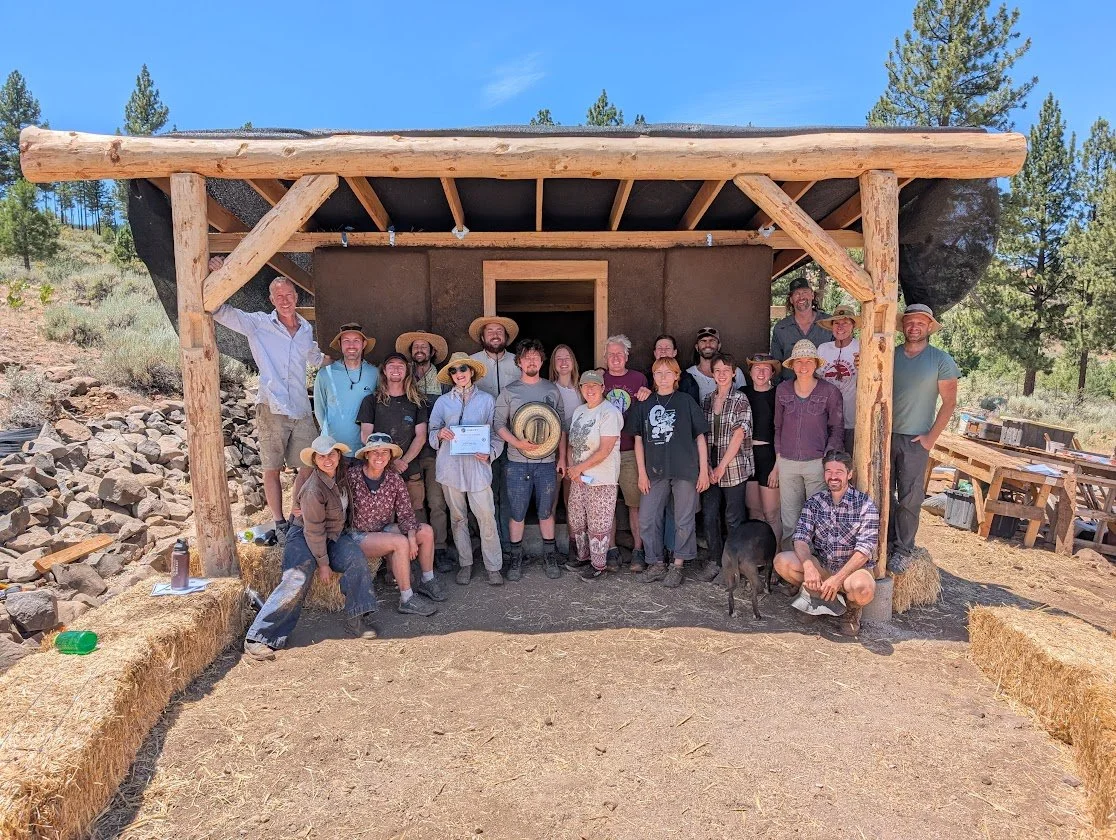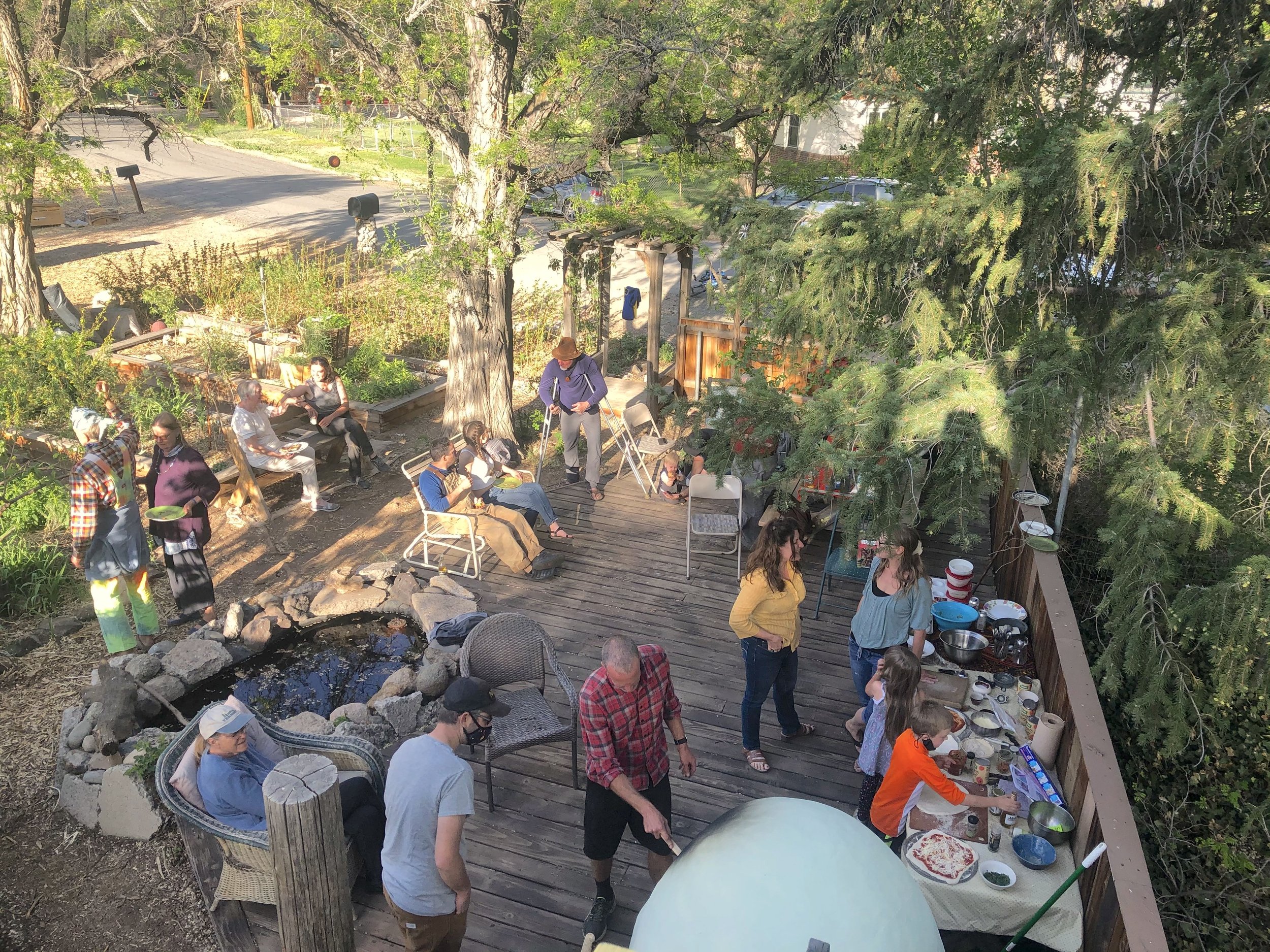
We teach natural building skills while the earthen soils teach connection to a primal and collective human experience.
Cobitat offers “Lifetime Tech Support” to former workshop participants to help ensure their building project is a success.
-

All About Earthbags
Free Class!
Join us for a half-day class on building with earthbags. We’ll build a stem wall as part of a rubble trench foundation system for the sauna we’re building in our 4D class.
Learn how to make a proper mix, how to stack and set the bags, and how to tamp and shape them for a strong, durable, and inexpensive stem wall.
Q and A with Kyle, Katy, and Nate and get to see other natural buildings.
Sunday, June 15 from 8:30 to 12:00 at Rosewater Ranch
-

One Day Intro to Natural Building
Complete
June 7, 2025
Join us at our urban homestead for a full day of exploration into the world of natural building. We’ll tour our site, make cob and adobe, build a small section of a garden wall, and play with plasters. At the end of the day we’ll host a pizza party dinner using our cob oven.
-

Earthen Pizza Oven
Complete
We’ll build a new cob pizza oven over a weekend. An earthen oven is a great beginner’s project because it includes so many elements of natural building in one compact build.
This workshop is at Alchemy Art Center on San Juan Island, Washington.
-

4th Dimension Quick Cabin Build
Complete
We’re excited to offer a 6-day cabin build.
There’s been a lot of hype lately about 3D printed concrete buildings “built in a day.” They’re fine, kind of, but our take is that natural building is better and 4D is our response. The 4th “D” is for time - we use timeless building techniques and materials (honoring and learning from the past) while cultivating a more sustainable and connected future.
We know that natural buildings can be built just as quickly, cost less, use greener materials like earth, wood, and straw, perform better, are nicer to live in, and are a heck of lot more fun to build, especially with a great group of people.
If you’ve got six days and want a lot of hands-on experience, this is for you.
-

NEW CLASS: Clay Plasters, Paints, and Sculpting
September 19-21
Join us for three days of plastering at Rosewater Ranch. We’ll make and mix several different types of natural earthen plasters to cover the sauna we built in July.
Clay slip, basecoats, straw-rich plasters, clay paints, brown coats, finish coats, lime/clay plaster, and sculptural mixes - you’ll have a chance to make and use all of them on an earthen/strawbale building.
-

Cobitat Complete Cabin
Hawaii, March 2024 (completed!)
Join us for a 5-week complete cabin build on the island of Maui at Maui Majesty Farm. We’ll go from the foundation to the roof as we create a beautiful 200 square foot cabin and an earthen oven.
If you’re serious about building your own structure or interested in going deep to become a natural building teacher, then this is the course for you.
Kenya Build
February/March, 2023
Big Thanks to the Sparks Rotary for their generous contribution to the project!
We went to Kenya to teach our techniques through a five-week complete cabin build. We worked with nine Kenyan apprentices and over 30 local Maasai women. Kyle and our American apprentice Thaddeus were there for all five weeks and Jonathan and Sarah for two.
The building site was just 40 km outside of Nairobi but a world away. It took about two hours to reach the site including a grueling hour and a half on the worst road I’ve ever been on. The land got drier the further out we went and soon goats and cows vastly outnumbered people. Maasai homes dotted the landscape as the plaintive hope for rain hung in the air with the dust. The vegetation, the ground, and the rocks were all shades of brown and tan. We wondered how people could live in such a barren place that was part of a bigger region seeing its worst drought in forty years. That thought remained until the end of week three when the heat and fierce nightly winds gave way to nightly thunder storms and then even heavy daytime rains. The rains had finally come for real and the land drank up everything that was given. In a matter of days, trees leafed out, grasses sprouted from between the stones, and insects by the thousands appeared in the air. It was a land transformed. We got the roof on just in time.
In Maasai culture, women are responsible for the building and upkeep of the traditional “manyatta” huts. Formerly a pastoral and nomadic people, their huts never needed to be large or even long-lasting. They were and still are built using upright sticks covered in mud. Now, however, the Maasai own property and are more settled but their manyattas have remained universally small, dark, smoky, and leaky.
They were excited to learn about how we build including how we make a trench and foundation, our plaster recipes, how thick and strong our walls are, how we can incorporate built-in shelves in thick cob walls, how we make adobe blocks, set in windows, and pour and trowel earthen floors. Our hostess, BT, told us she had never heard the Maasai dreaming about making better homes until they started building with us.
Our Kenyan apprentices were also excited to take what they learned into their next building projects including homes, ovens, floors, and interior plasters.
Each day at the work site there would be three - five languages being spoken: English, Swahili, Maasai, and then other tribal languages deepening on who was working or visiting. This often made it challenging to communicate instructions or technique. Swahili was most commonly used by the Kenyan apprentices (who represented 6 different tribes!) and our hostess while many of the Maasai knew only their native Maasai tongue with some knowing Swahili and maybe a couple words in English. Many of the apprentices were not fluent in English while we, of course, were limited to just English (although I definitely reverted to Spanish on occasion).
The cabin will be BT’s home when she retires from her job with a church in Nairobi.
She intends to use this experience as a springboard for further workshops, community work, and builds in the future:
earthen kitchen at the nearby primary school
earthen building for kids
cob ovens
Alternative septic/composting toilets
Organic gardening
Food dehydrating
Water harvesting
…and more
The trip was funded mostly through donations.





